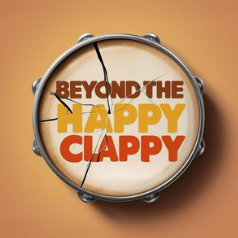Rob's message for February
Posted: Mon, 2 Feb, 2026 (2 weeks ago) by Rob

Recently I have been spending a lot of time listening to a podcast called Beyond the Happy Clappy. If you don’t know the phrase “happy clappy” you are in good company, because just before our wedding one of Cathryn’s extended family asked us if the service was going to be a bit “happy slappy!” it’s a slightly mocking term for churches which are characterised by more modern music with a band, and the expectation that the Holy Spirit will be working noticeably as people gather. It’s the sort of place where I have spent a lot of my Christian life, and where I feel at home, so I don’t tend to say it myself.
The podcast has tried to look back into the history of the happiness and clapping in this country, and especially how it has become so commonplace in the Church of England. At the same time, it is looking at some of the absolutely remarkable things that happened as churches began to embrace this from about 1960 onwards, and wondering about if and when and how we might see them happening again with that same sort of intensity.
It's easy to get nostalgic, especially in these villages where a lot of ministry of that kind, and a lot of remarkable things, were happening in the 80s and 90s. There’s a risk that you feel, or communicate, that that was the best of times, and nothing half as good has happened since. But it’s also easy to be cynical, and downplay the value of what God was doing then, and the lasting fruit it has had in people’s lives.
I don’t want to be either of those things. I want to be hungry, and curious. I do that because for myself, I haven’t really seen it: I was in church in the 80s and 90s, but by the time I really heard of the Holy Spirit those heady days weren’t quite here any more. But I also do it, because I just wonder from things I am hearing on this podcast, and right across the country, if something like that isn’t beginning to bubble up again.
Lots of the language I am hearing used as people try to discern what God is saying is to do with old wells being opened up, and new ones being dug. It’s being connected with an ancient story in the bible, where Isaac goes back to his father Abraham’s wells and does just that; he opens up the old ones, and digs new ones.
In these times of great global uncertainty it might seem odd for me to suggest that the future of our church, and maybe of our nation, is found in a little story tucked deep within the Old Testament. But what if it is? What if we all believed that God could reopen those spiritual wells I have only heard about, and dig new ones in our generation? What if – to quote a very happy-clappy song – we all believed that we would see him do it again?
Back to top of page
Rob's message for January
Posted: Sat, 3 Jan, 2026 (2 months ago) by Rob

Happy New Year!
Some of you will have houses like mine, where the whole festive season has been heavily populated with people singing songs to get ready for Oliver! the musical at Framingham Earl at the end of February. Even if you are in a different (I didn’t say fortunate) category, you might very well know the show, or the original 1960s film. Many of the songs are of course very famous, like “Food glorious food” or “Consider yourself”.
Another one you might know is “I’d do anything”: in fact, this was the name that the BBC also gave to the reality show where they were looking for new people to play Nancy and Oliver in the West End. In the song, the Artful Dodger and Oliver tell Nancy and Bet all the things that they would do to win their love, from painting their faces bright blue (this was some time before Braveheart or the Smurfs or Avatar) to fighting with terrifying Bill Sikes, and many more things in between. At the end they sum it all up with “I’d do anything, anything for you!”
Recently I’ve been reflecting on a line from a modern song that we have sung a bit in church, and I have bumped into in other places as well: “Blessed are those… whose joy it is to give it all for Jesus, and for Him only.”
For a long time I have agreed in my head with the idea of giving it all for Jesus, and I have tried my best to do that in my life and ministry, but this song has reminded me of something I think I might have lost track of: to give it all for Jesus.
I think people try and give their all for lots of things. You might do it for family, or in your work, or for a cause bigger than yourself, and there is a lot of good in all of that. But in thinking about giving it all for Jesus, I’ve noticed the other things I can give it all for which look a bit like Jesus, but are actually something a little different. Maybe I think I want to give it all for Jesus, but in truth I want to look good, or at least feel good about myself. Maybe I want the bishop to think I am one of the successful vicars. Maybe I want as many people as possible to like me. Do you begin to see how I can make all of those look a bit like giving it all for Jesus?
In the end I need to give it all for Jesus not because there is blessing in doing that, which I believe there is, and certainly not because I have to do it to make him love me more, or even at all, because I don’t. I need to do it because Jesus is worth it, and only Jesus; it is “for him only”. There are lots of ways to start a New Year, and lots of resolutions we might struggle a little bit to keep. One of the simplest, but most life-changing, is to begin saying to Jesus “I’d do anything, anything for you.”
Back to top of page
Rob's message for December
Posted: Fri, 12 Dec, 2025 (2 months ago) by Rob

What makes Christmas? What makes a perfect Christmas?
I know there are lots of reasons to think Christmas comes far too early, but when you are writing articles like this in the middle of November, it does really help that the adverts are all on already.
This year there are two very different, but particularly good ones, from opposite ends of the supermarket spectrum.
Waitrose have imagined a perfect Christmas romance, where shy beardy Joe Wilkinson meets superstar actress Keira Knightley at the cheese counter, and falls in love with her through the course of the Christmas season. All is lost when Joe finds a present in her house from a mysterious Mark, but after Joe declares his love with his Nan’s turkey pie, she reveals that Mark is her brother, and that she loves Joe too.
Tesco have gone the other way. A presumably right-wing Grandad has upset the family by “having an opinion”; a couple bicker over the way he is writing Christmas cards; two others sit awkwardly with a neighbour they have nothing in common with; a game of Pictionary descends into a full-on row about who Mum loves the most; a brother and sister can’t get on well enough just for one family Christmas photo. “Christmas isn’t perfect”, a voice says, “but that’s what makes it Christmas.”
Somewhere in the combination of these two very different stories is something like the true meaning of Christmas. On the one hand, we don’t live in a perfect world, and so we won’t have a perfect Christmas. People will argue, turkeys will be overcooked or undercooked or somehow both simultaneously, and someone will be ill. For all the very stylised pictures of the nativity story (my main complaint is how clean everything always is) the truth is that Jesus was born into the muck and mess and chaos of human family life, in the midst of an oppressive regime. Christmas has never been perfect.
Except it is. You and I aren’t perfect, and the world isn’t, but at the heart of Christmas is a love story like no other. It doesn’t start at a cheese counter – even a lovely Waitrose one – but at the moment before the creation of the world when God chose to make us out of a desire for love and relationship with us. And God wanted us so much, that despite us turning away from him, he sent his Son at Christmas. It is even more unlikely than the Waitrose advert, as God bridges a gap bigger still than the one between Joe and Keira, and all of humanity is embraced in the greatest romance there will ever be.
I hope you have a lovely Christmas, even if bits of it won’t be perfect. But most of all, I hope that this Christmas your attention might be caught by the great love story of the Son of God who came to be with you.
Back to top of page
Rob's message for November
Posted: Tue, 18 Nov, 2025 (3 months ago) by Rob

Even when you have been somewhere for a long time, and times of year like November, and Remembrance, come round again and again, there is always something new. This year we have a brand new Guide group in Stoke Holy Cross, and I’ll be visiting them at the beginning of the month to talk with them about Remembrance before some of them come and join us at Caistor St Edmund for our service on 9th November. For me it raises the question of how we can continue to remember, and to talk about remembering, as the generations go past, and those who go back as far as the Second World War are fewer and fewer.
If we are given half a chance, free from the distractions and safety net of every possible piece of information in a phone at our fingertips, people are pretty good at remembering. Cultures have found all sorts of ways of doing it, and there are lots of different examples in the bible.
One of my favourite ones is tucked away in the Old Testament. The Israelites are trying to establish themselves under the leadership of Samuel, and after one of their various victories, he plants a stone in the ground. He calls it the “Stone of help” (the source of the name Ebenezer) because God had helped them get to that point.
Today we still use stones to remember, of course, from individual graves, to war memorials, to the pebbles the Brownies will be painting poppies on. But while our stones tend to remember particular people, Samuel’s looks to God himself. He recognises that most of all it is God who has helped them, and so can we; one of the hymns we most often use on Remembrance Sunday describes God as our help in ages past.
Not just the past, though, which brings us back to where we started: the hymn goes on to talk about him being our hope for years to come, as well. If we say we follow Jesus, we are putting ourselves in a place between his first coming, in ages past, and his return, which is our future hope. He may have done extraordinary things up until now, worthy of many memorial stones, or their modern equivalent, but he will go on doing them until our brand new Guides and Brownies are the grownups encouraging a new generation to remember. And one day, when he does return, he will be what the hymn finally promises us: an eternal home.
Back to top of page
Rob's message for October
Posted: Wed, 1 Oct, 2025 (5 months ago) by Rob

As I write, I’m looking ahead to this weekend, and like every year, remembering back to September 1999. It was the first time I went and visited Christoph and his parents in Germany, after I got to know him when he spent some time at our school in England. At that point my German was particularly bad, so I didn’t really understand what his Mum was saying to me that first evening, but I was fairly sure she was talking about watching something on the television. “Lassneit!” she kept saying, with increasing exasperation. “Lassneit! Lassneit! Lassneit of the Proms!”
Suddenly we were both speaking the same language again, and we settled down for the usual combination of old favourites, strange modern classical music, and all those famous songs that everyone really looks forward to.
The Bible is full of famous songs, in books like the Psalms, but some of the most amazing singing comes towards the end, in Revelation. While sometimes reading it can seem like engaging with a foreign language, or listening to some very strange and unfamiliar themes, in the end the bits of the book we remember are those famous words about what we have to look forward to.
It's not really surprising that in the Messiah, surely one of the best pieces of classical music ever written, the climax comes with one of Revelation’s amazing songs: “Worthy is the Lamb who was slain.” I’m just putting it on again to listen as I type this bit. As they sing over and over “forever and ever”, the music going higher and higher, it’s as if my eyes and my heart lift with them, to look at Jesus, seated on the throne in heaven. And as I do, I agree with the choir that he is worthy of all power, and riches, and wisdom, and strength, and honour, and glory, and blessing.
What is so very striking of course, is why – why is Jesus worthy? – and there again, the song, and the Scriptures, are clear. It is because he is the Lamb who was slain, giving himself up for all of us. And this is for everyone: it’s not a choir just of Norfolk villagers, but a great multitude of tribes and tongues and peoples and nations.
That evening I spent in Germany all those years ago, finding something we had in common in spite of our differences, has stayed with me ever since. But you and I can look forward to something that is not just for an evening, or for once a year, but forever. One day we will be with Jesus, who is seated on the throne, forever. And ever. And ever. Amen…
Back to top of page
Rob's message for September
Posted: Wed, 1 Oct, 2025 (5 months ago) by Rob

Hello everyone
The summer months often feel very different, with people away on holiday, children off school, and lots of other things which can either keep us from home, or feel that there aren’t so many people around when we are here.
Feeling someone’s absence can be a powerful and difficult thing, as all those of you who have been bereaved will know only too well. Earlier this summer I was thinking again about the time Jesus himself went to the funeral of his friend Lazarus. Now there is a lot about this story which is remarkable including, of course, Jesus raising Lazarus from the dead, but one of the things that struck me was the sense of how much difference the absence of Jesus made. “Lord,” Martha said to Jesus, “if you had been here, my brother would not have died.”
For Jesus’s friends during his earthly ministry, it is easy to understand them thinking this way. A lot of what Jesus does happens when he is visibly present. He wasn’t with Martha, and Lazarus, and their sister Mary, when they really needed him. It would have made all the difference in the world.
As I reflected on this story for the second time this summer, Martha’s words were playing over in my head again, and I realised something in a way I never had before: they’re not ones that we can say any more. Jesus promises that if we believe in him, we will never be on our own. It might raise a lot of questions for us that Jesus was there when difficult things happened, but what we can’t say is “If you had been there.”
Something you might like to do, which helps me sometimes, is to think through difficult times and situations, and see if we can picture Jesus in them. How did he look? What was he doing? What did he say? It helps remind me that the fact that Jesus wasn’t physically present doesn’t me that he wasn’t absolutely there with me, by his Spirit, then and always.
It is sad when someone is absent, and a shame (sometimes!) when we can’t be in lots of different places at once, but perhaps it’s a helpful reminder that Jesus is the one person of whom we can never say “If you had been here…”
Back to top of page



